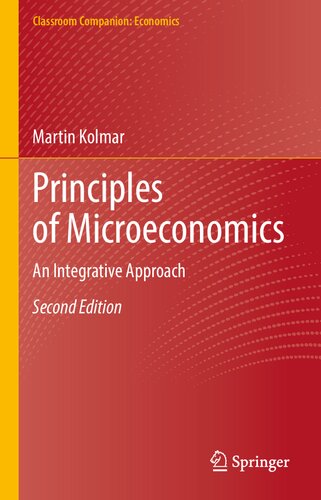

Most ebook files are in PDF format, so you can easily read them using various software such as Foxit Reader or directly on the Google Chrome browser.
Some ebook files are released by publishers in other formats such as .awz, .mobi, .epub, .fb2, etc. You may need to install specific software to read these formats on mobile/PC, such as Calibre.
Please read the tutorial at this link: https://ebookbell.com/faq
We offer FREE conversion to the popular formats you request; however, this may take some time. Therefore, right after payment, please email us, and we will try to provide the service as quickly as possible.
For some exceptional file formats or broken links (if any), please refrain from opening any disputes. Instead, email us first, and we will try to assist within a maximum of 6 hours.
EbookBell Team

4.0
36 reviewsThis textbook provides a comprehensive and unique introduction to modern microeconomics. It adopts an integrative approach, positioning the main findings of economics in a broader context. It critically reflects on theories from a philosophical standpoint and compares them to approaches found in the social sciences, while at the same time highlighting the implications for the design of legal systems and business practices.
Intended for undergraduate students, the book presents brief examples and comprehensive case studies to help them grasp the real-world implications of the theories. As such, it is suitable for an applied, yet technically precise approach to teaching microeconomics, as well as for a critical review of the economic mainstream. Starting from the question as to why and how societies organize economic activity, it analyzes the potential and limitations of various types of market with regard to alleviating scarcity and achieving distributive objectives, from an institutional perspective.
This second edition systematically expands on decision theory by including chapters on traditional decision theory under risk and uncertainty, and on behavioral economics, as well as a chapter presenting findings from the neurosciences, evolutionary psychology, and narrative psychology. Furthermore, there are theoretical additions, along with updated case studies and examples – from trade wars to pandemics and the climate crisis.
A new edition of the companion workbook features a wealth of exercises, ranging from basic multiple-choice questions to challenging mathematical problems and case studies, is also available.